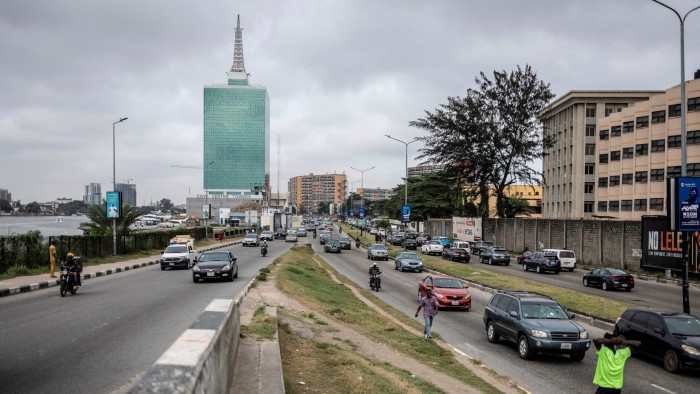Unlock the Editor’s Digest for free
Roula Khalaf, Editor of the FT, selects her favourite stories in this weekly newsletter.
Lagos, Nigeria’s economic capital, is home to 23 of the country’s 28 companies in this year’s Financial Times ranking of the fastest-growing African companies.
Odunayo Eweniyi, co-founder of fintech start-up PiggyVest, says companies flock to Lagos in part because of its size. The rapidly growing metropolis is one of the biggest cities in the world and the largest in sub-Saharan Africa, with some estimates putting its population at 20mn, accounting for 10 per cent of Nigeria’s total.
“If you’re big in Lagos, then you’re big in Africa,” Eweniyi adds. “You have an immediate scale and it’s a good place to test and scale your product.” She points to successes that she argues have made Lagos the “fintech capital” of Africa.
The most recent of these was a $110mn funding round for fintech group Moniepoint (ranked 16 this year based on 2023 revenues) in October, which gave it “unicorn” status with a valuation of at least $1bn — a rare bright spot given the recent gloomy funding market for African technology companies.
Other examples are PalmPay (ranked 2), Paystack, the payments processor that was acquired by Silicon Valley group Stripe in 2020, and competitor Flutterwave, which achieved a $3bn valuation three years ago.
Those and other successes saw Lagos ranked as the world’s top emerging tech hub in a recent survey by Dealroom, a global provider of data and intelligence on tech and start-up ecosystems.
Brian Odhiambo, partner at Novastar Ventures, a venture capital fund, says Lagos offers an “active angel investment network” that provides an early lifeline for companies still figuring out their product and strategy. “You see companies become bigger faster here because of the scale,” he says. “There’s an ecosystem here [in Lagos] that helps companies grow and our approach as investors is to be close to the market.”
Iyin Aboyeji, a serial technology entrepreneur and investor, who has been instrumental in building two successful start-ups, including Flutterwave, agrees. “Lagos makes it easy for people to build business,” he says.
Aboyeji points to the “density” of Lagos, where all major financial institutions are located close to each other in the business districts of Victoria Island and Marina, which makes it easier to set up meetings. He contrasts this to the split between Johannesburg and Cape Town in South Africa.

Yet Lagos’s crown is showing signs of slipping. The funding rush that bankrolled the earliest Nigerian start-ups has slowed — in line with the rest of the continent. The number of venture capital deals into Nigeria fell 7 per cent last year, although the country regained its position as Africa’s top investment destination, boosted by signature deals such as Moniepoint’s capital raising.
Start-ups in other sectors have also struggled to achieve the scale fintechs have in Lagos. But Odhiambo says that is only to be expected and that financial service providers are the “enablers’ in a city where “there are still financial inclusion gaps that need to be plugged”. He adds: “Only after you solve this can you build other industries.”
But the biggest issue in Lagos is the city’s poor infrastructure, given its size and global ambitions. Aboyeji laments the absence of “infrastructure for knowledge work”, pointing out that cities such as New York have facilities like the World Trade Center.
“There’s no campus of 5,000 capacity,” he says. “You’d struggle to find anywhere in Lagos that would take 3,000 people in one go.” He is now investing in a 72,000 square metre technology business park on the outskirts of Lagos to address the gap he sees in the market, his most ambitious project yet.
“Lagos has done a barely competent job of making business happen,” Aboyeji adds. “There’s basic security and some social infrastructure and liveable parts of the city. But I always feel it could be better . . . it’s definitely not punching above its weight.”

The transport infrastructure is also struggling to cope with Lagos’s fast-growing population, with residents often stuck in traffic. A recent bridge closure for maintenance work led to chaos on the roads, causing severe disruption for those commuting to the business districts of Victoria Island and Ikoyi for hours.
With the country facing its worst economic crisis in a generation, many young, skilled Nigerians are seeking better opportunities abroad. “Tech is losing a lot of its talent because of how difficult it is to live here,” says Eweniyi. “Remote work [in Lagos] helps, but most people just want to move abroad.”
Eweniyi spent 18 months working from the UK before returning to Nigeria because she found the distance made it almost impossible to run PiggyVest. But she acknowledges her case does not apply to employees outside top management.
“There are sacrifices I will make because I believe there’s something here. But I’m the founder and so I can’t tell people not to move because they don’t have to bear the same opportunity costs that I have. They have a different vision for their own lives . . . so how do we keep the talent?”
